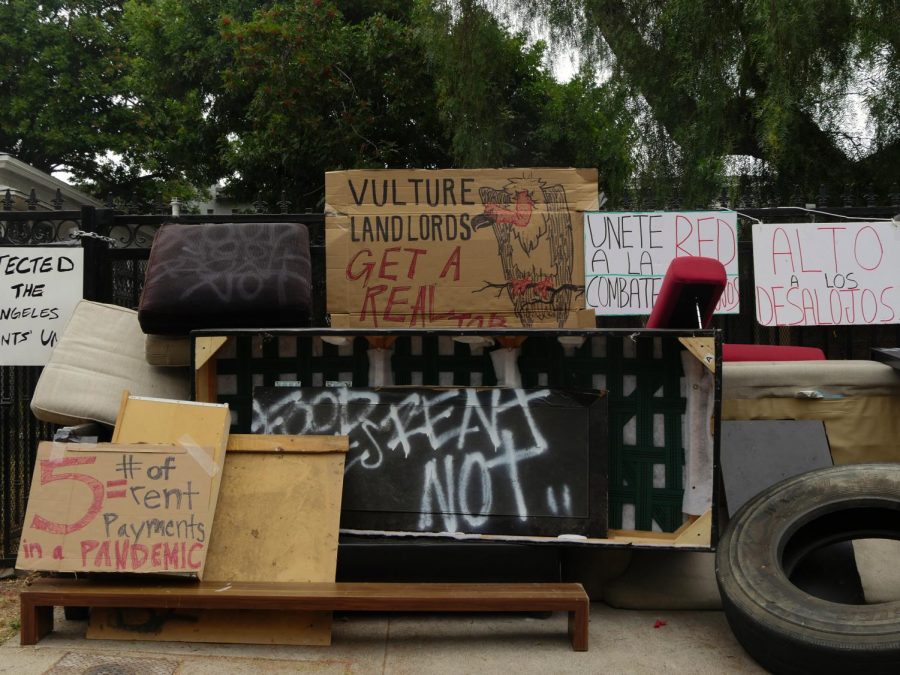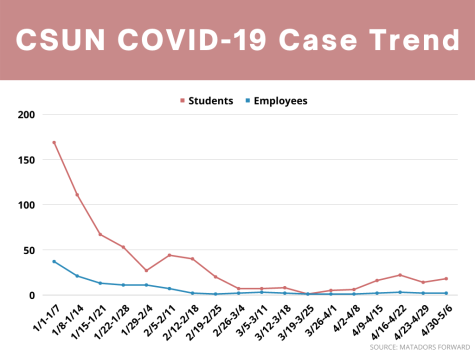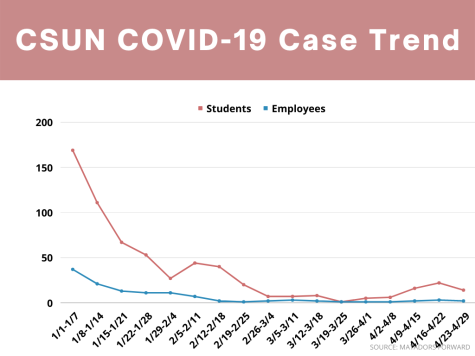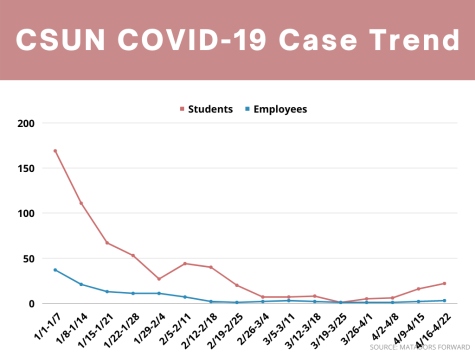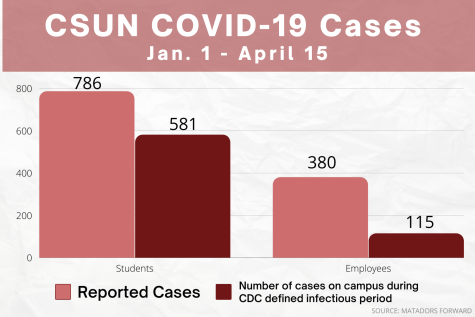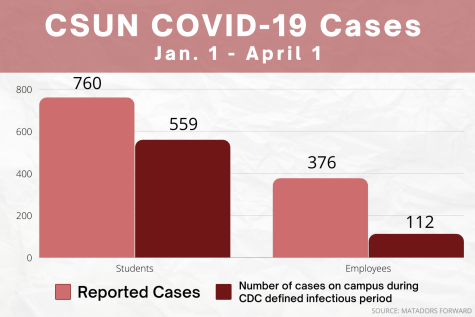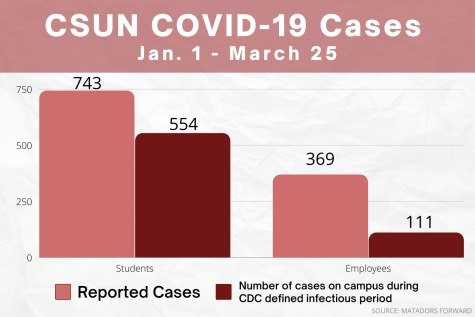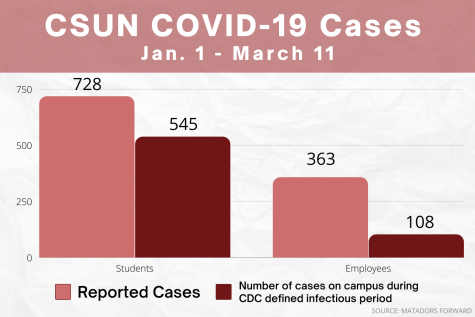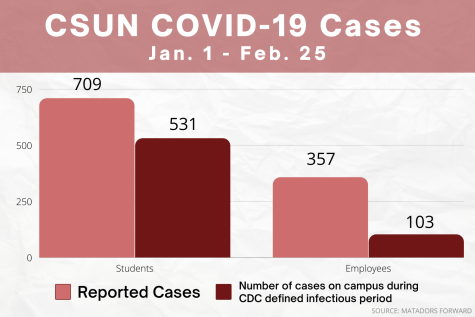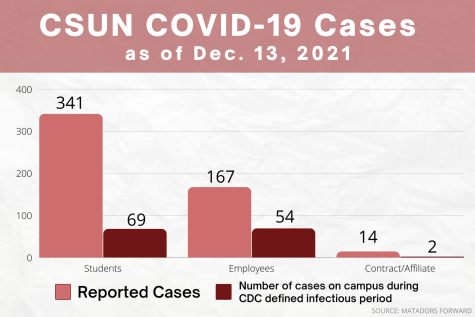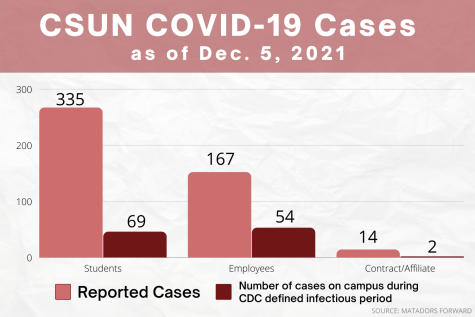L.A. Tenants Union and West Valley People’s Alliance help tenants understand their rights and provide eviction defense
Signs set up by the Los Angeles Tenants’ Union members at the residence of Betty Ordaz, who was being illegally evicted.
August 11, 2020
The Canoga Park chapter of the Los Angeles Tenants Union and the West Valley People’s Alliance held a “Tenants’ Rights and Eviction Defense Training” class via Zoom on Thursday. The meeting provided information to tenants about the process of legal eviction and how tenants can defend themselves from landlord harassment and illegal evictions.
Carla Orendorff, an organizer with the L.A. Tenants Union Canoga Park chapter, and other organizers at the meeting said illegal evictions and landlord harassment are a large threat during the COVID-19 pandemic.
“We are here to build tenant power through education, advocacy and direct action,” Orendorff said at the meeting.
The L.A. Tenants Union focuses on organizing, protecting and educating renters. LATU has several chapters in the greater L.A. area and regularly holds meetings about eviction defense and activism. They also send out what they call “rapid response teams,” which are made up of volunteers who will occupy the residence of someone facing eviction to prevent harassment and protect the tenant.
The West Valley People’s Alliance, a progressive activist group that works within the west San Fernando Valley, was formed in response to “systemic justice issues (that) the pandemic brought to the forefront,” according to Katherine Tattersfield, a strategy team organizer for WVPA.
At the meeting, Orendorff said that LATU is seeing an uptick in landlords harassing tenants who are unable to pay rent. Although it is illegal for landlords to change locks, call the U.S. Immigration and Customs Enforcement, or in any way threaten tenants without filing a proper eviction case, Orendorff said LATU sees this happen frequently.
Medina said that one common method used to scare tenants is putting eviction notices on doors without actually filing a case.
One meeting attendee described an incident where she missed her eviction notices because her landlord kept stealing her mail.
“I don’t want to scare anyone, but … if your onsite manager has access to your mail, that might be a possibility as well, if they’re really trying to get rid of you,” the attendee said.
Nathaly Medina, the solidarity attorney with the Eviction Defense Network, said that although the Sheriff’s Department is the only authority that can legally lock a tenant out, the landlord will often attempt a lockout. “If it’s not the sheriff who locks you out, I’d suspect it’s an illegal eviction,” Medina said.
The LATU and WVPA organizers emphasized their belief that the best way for tenants to defend themselves against landlords is to organize.
“The landlords have a lot of money and power, but there are more of us,” Orendorff said.
“The landlords have a lot of money and power, but there are more of us.”
– Carla Orendorff
So far, renters and homeowners in California have been protected by a patchwork of legal protections and emergency orders that vary widely by city and county. L.A. County currently has an eviction moratorium in place through Sept. 30.
Tenants may not be evicted if they are affected by COVID-19 and cannot afford rent, so long as they give seven days notice to their landlord. Tenants can choose to pay their rent back over 12 months.
Gov. Gavin Newsom passed an executive order in March to suspend evictions statewide. The order extends the amount of time tenants have to respond to eviction notices and prevents landlords from evicting a tenant who cannot pay rent due to COVID-19, but it does not prevent landlords from evicting a tenant generally.
Tenants rights groups like Knock LA have slammed the order, calling it “absurd” and “useless,” and said that it wasn’t enough to protect tenants.
An early report by the COVID-19 Eviction Defense Project found that 19 to 23 million Americans who live in renter households are at risk of eviction by Sept. 30, but later estimates found that number to be between 30 and 40 million.
An analysis of L.A. Police Department data by the L.A. Times found that in the 10 weeks after Mayor Eric Garcetti instituted a city-wide moratorium on evictions in March, police responded to more than 290 illegal lockout calls, which were mainly concentrated in Black and Latino South L.A. neighborhoods; these neighborhoods have some of L.A. County’s highest number of COVID-19 cases, according to L. A.Times data.
In April, the California Judicial Court passed an emergency court rule which “prohibits courts from issuing a summons after a landlord files an eviction case, unless necessary to protect public health and safety,” for the duration of the COVID-19 state emergency and 90 days after, according to the Western Center on Law & Poverty.
Simply put, if a landlord files an eviction case, the tenant does not need to respond until after the emergency rule expires, unless the court finds that an eviction is necessary. LATU said that they expected around 365,000 cases to be filed in March, but because of the emergency court rule, they have only seen about 350 cases per month since March.
The California Apartment Association, a landlord lobbying group, opposed the emergency order, calling it “overly broad, unnecessary,” and said that it would “tie the hands of landlords.”
In June, the Apartment Association of Greater L.A. filed a lawsuit against the city, saying that the emergency orders did not do enough to protect the constitutional rights of landlords.
“The Eviction Moratorium would force owners to allow tenants who have stopped paying — and may never pay again — to continue to occupy their units for many months and likely well into 2021,” the lawsuit said.
During a July 24 Judicial Council meeting, California Chief Justice Tani G. Cantil-Sakauye warned that the April emergency order would lapse on Aug. 14 if lawmakers do not vote to extend it.
Lawmakers are trying to pass bills that would offer aid to both tenants and owners. Assembly Bill 1436, authored by Assemblyman David Chiu (D-San Francisco) and Assemblywoman Monique Limón (D-Santa Barbara) would effectively ban eviction for tenants affected by COVID-19 until 2021, and provide mortgage forbearance to homeowners, which would help landlords affected by a loss of rent.
The California Apartment Association said that AB 1436 will create hardship on owners and lead to an even bigger housing crisis. The California Apartment Association sponsored Senate Bill 1410 instead; if SB 1410 is passed later this month, the state of California would directly pay rent for tenants who cannot pay due to COVID-19.
The UC Berkeley Terner Center For Housing Innovation estimates that at least one person in close to one million renter households in California has experienced pandemic-related unemployment, and that three quarters of those households include a person of color.
WVPA and the LATU encouraged attendees to take action at their meeting, saying that lawmakers will not continue their support for tenants without pressure from their constituents.
“All it takes is waking up and making a phone call,” Medina said.
